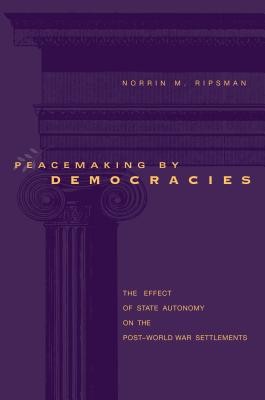
- We will send in 10–14 business days.
- Author: Norrin M Ripsman
- Publisher: Penn State University Press
- ISBN-10: 0271023988
- ISBN-13: 9780271023984
- Format: 15.3 x 22.7 x 2.1 cm, softcover
- Language: English
- SAVE -10% with code: EXTRA
Reviews
Description
When theorists explain how democracies conduct foreign policy, they tend to ignore or downplay differences and assume that democratic governments all behave similarly. Challenging this assumption, Norrin Ripsman breaks down the category of "democracy" to argue that differences in structural autonomy among democratic states have a lot to do with how foreign security policies are chosen and international negotiations are carried out. Concluding with an examination of the implications of these findings for security policy in contemporary democracies, Peacemaking by Democracies combines innovation in international relations theory with careful primary research in historical archives.
EXTRA 10 % discount with code: EXTRA
The promotion ends in 16d.02:39:00
The discount code is valid when purchasing from 10 €. Discounts do not stack.
- Author: Norrin M Ripsman
- Publisher: Penn State University Press
- ISBN-10: 0271023988
- ISBN-13: 9780271023984
- Format: 15.3 x 22.7 x 2.1 cm, softcover
- Language: English English
When theorists explain how democracies conduct foreign policy, they tend to ignore or downplay differences and assume that democratic governments all behave similarly. Challenging this assumption, Norrin Ripsman breaks down the category of "democracy" to argue that differences in structural autonomy among democratic states have a lot to do with how foreign security policies are chosen and international negotiations are carried out. Concluding with an examination of the implications of these findings for security policy in contemporary democracies, Peacemaking by Democracies combines innovation in international relations theory with careful primary research in historical archives.


Reviews